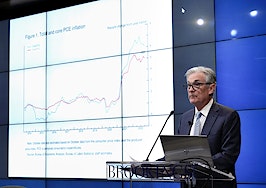Policymakers at the Federal Reserve on Wednesday restated their commitment to keeping a lid on long-term interest rates, saying they’ll continue buying $80 billion in long-term Treasurys and $40 billion in mortgage-backed securities each month “until substantial further progress has been made” toward the Fed’s employment and price stability goals.
But the Federal Open Market Committee’s “dot plot” now shows a growing consensus for boosting the short-term federal funds twice by the end of 2023. All but five of the committee’s 18 members anticipate at least one increase.
Last year, the committee brought the federal funds rate — the rate banks pay for overnight loans — to 0 percent in an attempt to lessen the economic impacts of the pandemic. With increases typically implemented 25 basis points at a time, two rate increases would bring the federal funds rate back to 0.5 percent.
With inflation already exceeding the Fed’s 2 percent target, many economists expect the Fed to at least signal its intentions to tighten in the future by tapering its purchases of Treasury and mortgage bonds. The Fed will telegraph any moves in advance to avoid a repeat of the “taper tantrum” of 2013 that soured investors on bonds, driving up long-term interest rates.
Although the Fed was not expected to act at this meeting, committee members’ views on recent inflation data are closely watched.
In a statement, members of the Federal Open Market Committee acknowledged worries about inflation, but said that, for now, they’re willing to let inflation rise “moderately above 2 percent for some time” as long as longer-term expectations remain “well anchored” at 2 percent.
“Inflation has risen, largely reflecting transitory factors,” the committee said. “Overall financial conditions remain accommodative, in part reflecting policy measures to support the economy and the flow of credit to U.S. households and businesses. The path of the economy will depend significantly on the course of the virus. Progress on vaccinations will likely continue to reduce the effects of the public health crisis on the economy, but risks to the economic outlook remain.”
Mike Fratantoni, chief economist for the Mortgage Bankers Association, noted that even though the committee characterized inflationary pressures as being “largely” due to transitory factors, “this recognizes that some of the price increases are likely to persist for a longer period.”
“Longer-term interest rates, including mortgage rates, jumped earlier this year as vaccinations began and the government pushed more fiscal stimulus into the economy,” Fratantoni said. “In the past few months, mortgage rates have moved within a very narrow range. While the Fed has not yet laid out specific plans with respect to tapering their Treasury and [mortgage bond] purchases, the changes in their forecasts for the economy, and for their rate target, suggests that tapering is close at hand. As a result, mortgage rates are likely primed to move at least somewhat higher.”
Pantheon Macroeconomics Chief Economist Ian Shepherdson said the shift in the dot plot, “presumably means that more [committee] members now are ready to talk tapering,” so Federal Reserve Chairman Jerome Powell “is not going to be able to repeat his March/April stonewalling. He’s not going to fold, though, and we expect him just to acknowledge that the discussion is underway, but that a firm decision is a way off, pending more information on inflation and the labor market after the summer.”
At a press conference after Wednesday’s meeting, Powell promised the Fed “will provide advance notice before announcing any decision to make changes to our purchases.”
But investors seemed to agree that tapering now looks to be closer at hand, with yields on 10-year Treasury notes — a key indicator of where mortgage rates might be headed — up by more than 10 basis points as investors shunned bonds.
In their latest monthly forecast, economists with Fannie Mae’s Economic and Strategic Research Group said soaring home prices and rents could drive inflation out of the Federal Reserve’s comfort zone. That could result in higher interest rates, which would be another potential drag on sales.
Fannie Mae economists downgraded their forecast for second and third quarter home sales, “largely due to the ongoing lack of available listings and a softening pace of new construction due to supply constraints affecting homebuilders.”
Critics say that if the Fed waits too long to raise rates, it could fuel runaway inflation or speculation that leads to a financial crisis.
In a guest essay for The New York Times, former investment banker William Cohan said the Fed should begin tapering its bond purchases, and “keep doing it even after the markets have their tantrum.”
“Anyone borrowing money in this country — that’s an awful lot of people — prefers low interest rates,” Cohan wrote. “There’s the federal government, which owes creditors more than $28 trillion. Every day, according to the Peterson Foundation, the government spends nearly $800 million on interest to service the growing federal debt. Corporations also love low interest rates: They make borrowing money cheap and thus corporate profits plentiful. The cost of a home mortgage remains historically low.”
But at some point, Cohan wrote, “the years of excess in the financial markets will likely lead to a volcanic economic disruption. Capital markets will seize up, and debt and equity financing will be largely unavailable. Years of economic pain and turmoil will follow, with the worst of it, as ever, borne by those least able to handle its consequences. Just as in the aftermath of 2008, the blame will be diffuse.”













